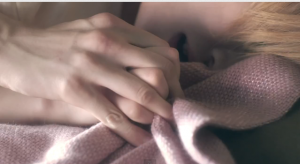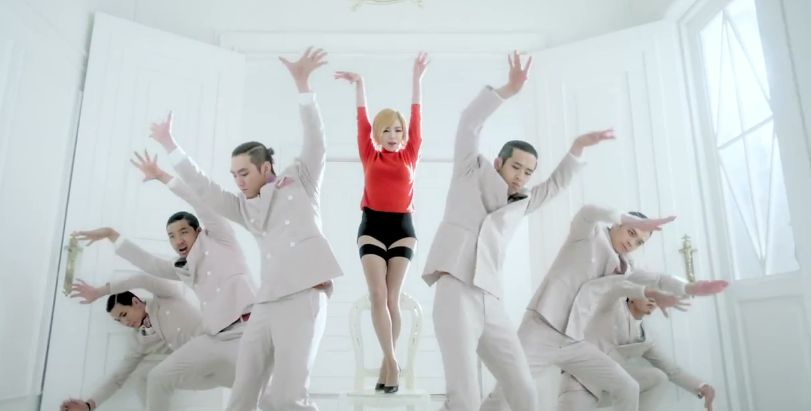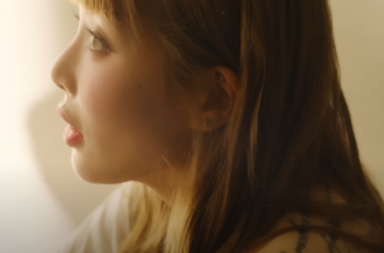 It wouldn’t be an exaggeration to say that K-pop is rife with double standards, the grand majority of which are related to gender and sexuality. Usually, these double standards have something to do with girl groups vis-a-vis their male counterparts; relative to groups comprised entirely of males, girl groups often become the sole and unfair targets of legislation that aims to end “objectification” and inconsistent, arbitrary bans on revealing clothing and inappropriate choreography. The standard complaint (one that I have made time and time again) is that male idols tend to get a pass on shirt-ripping and pelvic-thrusting, but female idols that do the exact same thing wind up getting roundly criticized and ultimately penalized within the entertainment industry. What’s more, these double standards aren’t just limited to the stage and radio; let’s not forget that female idols are far more often berated for being/appearing rude and disrespectful than are males, suffer disproportionately in terms of bad publicity for making poorly-thought-out comments, and are in general more likely to have judgements made regarding their on-stage personas projected onto their personal lives and character. This is not a problem endemic to South Korea, but to most entertainment industries.
It wouldn’t be an exaggeration to say that K-pop is rife with double standards, the grand majority of which are related to gender and sexuality. Usually, these double standards have something to do with girl groups vis-a-vis their male counterparts; relative to groups comprised entirely of males, girl groups often become the sole and unfair targets of legislation that aims to end “objectification” and inconsistent, arbitrary bans on revealing clothing and inappropriate choreography. The standard complaint (one that I have made time and time again) is that male idols tend to get a pass on shirt-ripping and pelvic-thrusting, but female idols that do the exact same thing wind up getting roundly criticized and ultimately penalized within the entertainment industry. What’s more, these double standards aren’t just limited to the stage and radio; let’s not forget that female idols are far more often berated for being/appearing rude and disrespectful than are males, suffer disproportionately in terms of bad publicity for making poorly-thought-out comments, and are in general more likely to have judgements made regarding their on-stage personas projected onto their personal lives and character. This is not a problem endemic to South Korea, but to most entertainment industries.
However, the release of Brown Eyed Girls‘ maknae Ga-in‘s latest solo effort, “Bloom,” has highlighted yet another double standard implicit in the world of K-entertainment — and this time, women are not only the victims, but also the victors. And this has got people talking.
[youtube http://www.youtube.com/watch?v=K64mb5KUhhs&w=600&h=360]It is pointless to beat around the bush: “Bloom” pushes boundaries. As my fellow writer Nabeela said in her excellent music video review, “Bloom” doesn’t just come uncomfortably close to themes of the discovery of one’s sexuality, it portrays them using visuals that are both striking and shocking. I can’t think of any other K-pop music videos that portray masturbation and sex quite so literally. It is true that a lot of songs and music videos have been breaking ground recently (the music videos for Nell‘s “The Day Before,” BabySoul and Yoo Ji-a‘s “She is a Flirt” and most recently, K. Will‘s “Please Don’t” all indirectly and directly confront homosexuality and homosexual relationships), but Ga-in’s music video tackles female sexuality in a way that is rarely done in K-pop. Which is not to say that female sexuality is hard to find in K-pop (on the contrary, it’s practically omnipresent); however, it is true that female sexuality often takes on a radically different face when presented by K-pop idols. And therein lies the rub. Though the format might be different, isn’t Ga-in simply doing what all other female idols in South Korea do? Isn’t she using sex to appeal to men just like everyone else? Why is Ga-in getting a lot of kudos for essentially daring to do what a female K-pop idol has yet to do and include a decently graphic sex scene in her music video, while other female idols often earn the derisive title of “slut” for injecting a sexual element into their videos?
 Slut-shaming — defined by this feminist blog as “shaming and/or attacking a woman or a girl for being sexual, having one or more sexual partners, acknowledging sexual feelings, and/or acting on sexual feelings” — is not an infrequent occurrence in K-pop. Working alongside this definition, slut shaming usually occurs when a female artist or idol group releases material (be it a new song, music video, or choreography) that is strongly sexually suggestive. If you follow K-pop regularly, a few examples should come immediately to mind: Rania was slapped with some heavy duty slut-shaming following the release of “Dr. Feel Good,” and 4Minute‘s HyunA gets a large dose of it nearly every time she does anything (but “Bubble Pop” might have been the worst). Recently, Secret has come under a bit of criticism for their latest single “Poison”‘s provocative choreography. There are many, many obvious and hideous problems associated with slut-shaming, but in the realm of K-pop, perhaps the largest is that a young woman’s career as a pop star really has nothing to do with her personal life whatsoever — and projecting the image that she portrays as a celebrity, that does her job, onto her character, not only should require a fantastic leap of logic, but is also ridiculously wrong and unfair.
Slut-shaming — defined by this feminist blog as “shaming and/or attacking a woman or a girl for being sexual, having one or more sexual partners, acknowledging sexual feelings, and/or acting on sexual feelings” — is not an infrequent occurrence in K-pop. Working alongside this definition, slut shaming usually occurs when a female artist or idol group releases material (be it a new song, music video, or choreography) that is strongly sexually suggestive. If you follow K-pop regularly, a few examples should come immediately to mind: Rania was slapped with some heavy duty slut-shaming following the release of “Dr. Feel Good,” and 4Minute‘s HyunA gets a large dose of it nearly every time she does anything (but “Bubble Pop” might have been the worst). Recently, Secret has come under a bit of criticism for their latest single “Poison”‘s provocative choreography. There are many, many obvious and hideous problems associated with slut-shaming, but in the realm of K-pop, perhaps the largest is that a young woman’s career as a pop star really has nothing to do with her personal life whatsoever — and projecting the image that she portrays as a celebrity, that does her job, onto her character, not only should require a fantastic leap of logic, but is also ridiculously wrong and unfair.
As mentioned, slut-shaming often occurs whenever something in K-pop seems too overt in sexual content — and we know that, despite the New York Times‘ absurd insistence that the K-pop machine runs on “innocence and hair gel,” K-pop is often powered by (and paid for by) sex. In particular, girl groups and female idols are often responsible for producing content that seems constructed entirely for the male gaze; in other words, every aspect of performances like that of “Bubble Pop” are calculated with male desire and fantasy in mind. And indeed, a lot — a lot — of girl group performances are sexually charged to the point of being cringeworthy, especially for the female audience. Idols like Girls’ Generation are often marketed on the premise that they represent the modern image of healthy femininity in South Korea — but for any woman with even the slightest feminist inkling, the infantilized, aegyo-laden singing coupled with risque choreography and coy “come hither” glances at the camera can be difficult, if not impossible, to swallow or take seriously. That girl groups so obviously and blatantly pander to men can make one wonder why women bother to become fans of theirs at all — and it also explains why women are often the loudest in their slut-shaming of K-pop ladies.
 But according to the definition of slut-shaming provided above, Ga-in should be guiltier than all the rest — after all, rather than playing into the hands of a hypothetical man, Ga-in gets it on with a real man. Not only that, but she looks like she is clearly enjoying herself; K-pop might have just seen it’s first on-screen orgasm. But I’m going to argue that the actual presence of a man, the masturbation, the potential orgasm — all of this completely obvious, in-your-face sexuality is actually what has made people (including this writer) less inclined to slut-shame Ga-in. HyunA’s sexuality is largely meant for anonymous men; Ga-in’s, on the other hand, is meant as much for women as it for for men. Essentially, what Ga-in does is take female sexual desire, wrest it from the men who have manipulated it to their own device, and put it back in female hands. Ga-in’s sexuality is something that women can get behind, and that’s something you can’t much say for the rest of K-pop; that she herself is portrayed as taking pleasure as much as she is giving it is unique, fresh, and deeply relatable to female viewers.
But according to the definition of slut-shaming provided above, Ga-in should be guiltier than all the rest — after all, rather than playing into the hands of a hypothetical man, Ga-in gets it on with a real man. Not only that, but she looks like she is clearly enjoying herself; K-pop might have just seen it’s first on-screen orgasm. But I’m going to argue that the actual presence of a man, the masturbation, the potential orgasm — all of this completely obvious, in-your-face sexuality is actually what has made people (including this writer) less inclined to slut-shame Ga-in. HyunA’s sexuality is largely meant for anonymous men; Ga-in’s, on the other hand, is meant as much for women as it for for men. Essentially, what Ga-in does is take female sexual desire, wrest it from the men who have manipulated it to their own device, and put it back in female hands. Ga-in’s sexuality is something that women can get behind, and that’s something you can’t much say for the rest of K-pop; that she herself is portrayed as taking pleasure as much as she is giving it is unique, fresh, and deeply relatable to female viewers.
A lot of people have attempted to make the argument that Ga-in has avoided the “slut” stamp because she’s in some way classier than are other K-pop stars. I don’t know how one could prove this, but that doesn’t seem to me to be a proper justification for why we ought not slut-shame Ga-in. Really, Ga-in is just doing female sexuality right. She’s giving it back to autonomous women, women who are not simply a pawn in a man’s fantasyland, but sexual beings who have desires and needs just as any other humans do. And how.
Is it fair that Ga-in has somehow emerged less unscathed than do her fellow idols? Yes and no. On the one hand, Ga-in went further than any other K-pop female idol has before and directly inserted sex in its most raw form right into her music video (alongside a clever image of herself dancing around a pole while water gushes around her — I see what you did there, Ga-in). On paper, it seems far more crude than watching HyunA dance in front of a car in booty shorts. And yet, though Ga-in is directly engaged in the act of sex and pleasure itself, she emerges as the empowered one; she is a willing and equal participant in her sexuality, while HyunA is a carefully designed product intended for consumption by men and men alone. It should be noted that HyunA’s disempowerment is not necessarily her fault (and sadly, she has become the poster child for hypersexuality in K-pop), but that doesn’t change the fact that her portrayal of female sexuality might alienate women in its desperate pandering to men. Neither Ga-in nor HyunA deserve to be slut-shamed, but until HyunA’s brand of sexuality appeals to females as well as males, it will be women like her — and not Ga-in — who bear the brunt of feminist angst and slut-shaming in Korean entertainment.



